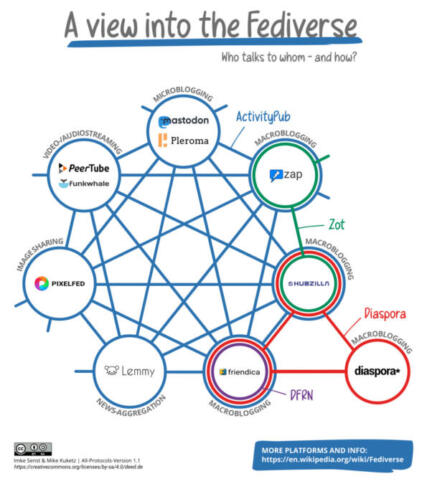Most students around the world have one thing in common as soon as they are admitted to a university: an official university e-mail address. While today the university e-mail address is probably a second, third, or even fourth address for most freshmen and freshwomen, in the early days of the internet, it was often their first e-mail address.
The curious thing about universities‘ decision to use e-mail as the primary communication channel was that e-mail is an open standard. The university e-mail address not only provides students with official information from their university, but they can also use it for any other purpose. At the same time, e-mail does not belong to anyone; universities usually operate their own mail servers.
University e-mail addresses were and are not a silo but a gateway to the digital e-mail world. And with good reason: science is an international endeavor, and the ability to communicate across university boundaries is essential. How absurd would it be to establish a mail system that only works within one university?
Where are the universities in the Fediverse?

Most of what applies to e-mail also applies to Mastodon and other Fediverse services. Therefore, the question arises, why don’t universities already operate their own Mastodon or Friendica instances in addition to their own e-mail servers – and not only for organizational units and teachers, but also for their students? Why don’t students receive a Mastodon handle along with their e-mail address when they enroll? Why don’t universities host lecture videos via PeerTube in the Fediverse?
There is a case to be made for greater university involvement in the Fediverse:
- Decentralization: Decentralized social networks correspond to the decentralized nature of research and teaching at universities. Just as the internet was initially primarily a network of university networks, universities could also contribute to bringing the Fediverse from the niche into the mainstream, creating an ideal communication infrastructure for scientific exchange.
- Non-commerciality: Universities would do well not to outsource central communication infrastructure to profit-oriented companies. This can be observed in the (negative) example of the scientific publication market in general and major publisher Elsevier in particular. The same applies to scientific social networks as seen in (negative) examples such as ResearchGate or Academia.edu, which are conspicuous for their lack of transparency and spam.
- Sociality: Universities have always been much, much more than what happens in the lecture hall. In the exchange among each other, between „peers,“ probably just as much knowledge transfer happens as in the courses themselves – not to mention lifelong friendships and networks.
- The local timeline as a local student community: In large instances such as Mastodon.social, the added value of the local timeline is limited due to the diverse user base. In a university instance with automatic membership of all students and lecturers, the local timeline would be the university’s own public social media platform.
- The local timeline as an alumni network: At the same time, the instance can also be a low-threshold way to stay in touch with university graduates—a social alumni network, so to speak. Considering that universities are investing more and more resources in the development and maintenance of alumni networks, a separate university instance would make sense for this reason alone.
The challenge of moderation
Of course, there are challenges associated with university Fediverse offerings:
- Moderation effort: The need for moderation is certainly the first and most important concern when it comes to universities having their own Mastodon instances. And this is probably also the biggest cost point: it will not work without professional community management. However, there is a lot to be said for using them primarily to train and supervise volunteer moderators, who could be recruited among students and faculty.
- Spam: Spam problems exist not only in e-mail but also in the Fediverse. However, there are established tools to contain spam. Additionally, since university instances are primarily open to (former) university members, the spam problem should be less prevalent compared to completely open instances.
- (De-)federation decisions: Decisions about which instances in the Fediverse are (not) federated are always political decisions. This applies to university instances as well. Thus, transparent rules and decision-making processes will be needed to determine who can and should make such decisions and how. However, this is not an insurmountable issue but rather a question of university self-administration.
- Costs: The costs of operating a Mastodon or Friendica instance at a university are manageable. Larger universities in particular usually have well-equipped internal IT services that can easily host Fediverse instances. Therefore, the costs should be of minimal concern.
Conclusion
Universities and colleges are ideally positioned to be involved in the Fediverse. In fact, researchers from around the world are already there, as evidenced by the various disciplinary opt-in lists of Academics on Mastodon. They recognize the Fediverse’s potential to contribute to publicly owned scholarly knowledge, as Björn Brembs and colleagues have advocated for in Nature.
First tentative steps with Mastodon instances by universities such as MIT, non-university research associations like the Helmholtz Association and the Mastodon pilot for research and education by the Dutch Surf.nl point already into this direction. However, the full potential of decentralized social networks will only become clear when universities also bring students into the Fediverse.
This post is an English and slightly updated version of this German article.





Dear Universities,
please don’t fall for the press-induced hype about Mastodon. It’s a memory-hog. Use Pleroma or Akkoma instead. They also don’t have the dumb limit of 500 characters in a posting.
In Sweden, our national research and education network (NREN) SUNET set up a mastodon server under social.sunet.se. All Swedish university staff can easily create an account with their single sign on solution from their respective higher education institution. I wish more colleagues and institutions will use it. I will actively work towards that.
Universitaeten geben nach und nach den Betrieb eigener Mailserver auf, weil die IT-Abteilungen damit ueberfordert sind. Derselbe Effekt koennte bei Fediverse Instanzen auftreten.
Das stimmt, ist aber völlig unabhängig vom Fediverse ein Problem.
Question to author: How is the situation in your university (you mentioned discussions on the Q&A for the january article)?
As far as I know, University of Innsbruck will launch its own Mastodon instance in autumn; however, it will be only for official departments/Centers and closed to students – at least for now.